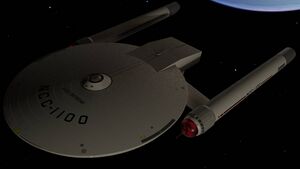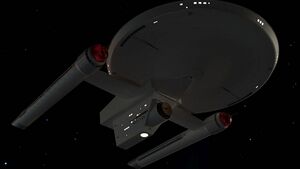(Created page with "thumb thumb ; Dimensions : 258 x 174 x 55 meters ; Crew Capacity : 316 Total (80 Officers and 205 Crew) ; Cruising Speed : Warp 5.77 ; Max Speed : Warp 7.95 ; Emergency Speed : Warp 8 for 30 Minutes ; Power Source : Matter / Antimatter Reactor<br>Deuterium Fusion Reactors ; Propulsion : Impulse Drive<br>Warp Drive ; Deck Plans : General Plans The Detr...") |
No edit summary |
||
| (3 intermediate revisions by the same user not shown) | |||
| Line 1: | Line 1: | ||
[[File:{{#setmainimage:detroyat-class-original-1.jpg}}|thumb]] | |||
[[File:detroyat-class-original-2.jpg|thumb]] | [[File:detroyat-class-original-2.jpg|thumb]] | ||
; Dimensions : 258 x 174 x 55 meters | ; Dimensions : 258 x 174 x 55 meters | ||
; Crew Capacity : 316 Total (80 Officers and 205 Crew) | ; Crew Capacity : 316 Total (80 Officers and 205 Crew) | ||
| Line 10: | Line 10: | ||
; Deck Plans : [[:File:Detroyat-class-plans.pdf|General Plans]] | ; Deck Plans : [[:File:Detroyat-class-plans.pdf|General Plans]] | ||
The Detroyat Class Starship was originally a | The Detroyat Class Starship was originally a designed as a Heavy Destroy. Deceptively large for a ship with a destroyer classification in the 23rd century, these vessels were built for speed and maneuverability rather than for their potential fighting capabilities. The ships were known to be resource-heavy to produce, owing to their sturdy space-frame and being constructed for high speed maneuverability. The vessel design was refit twice, the initial refit was in the mid-23rd century and had the primary goal of reducing production costs while maintaining structural integrity standards which made the vessel such a work-horse. It was then reclassified as a Light Destroyer (rather than Heavy Destroyer). Then toward the end of the 23rd century the vessel was refit again using technologies perfected on the [[Constitution Class Refit]] and Excelsior Class designs. | ||
== Offensive Systems == | == Offensive Systems == | ||
| Line 26: | Line 26: | ||
<gallery> | <gallery> | ||
File:detroyat-class-refit-a-1.jpg | File:detroyat-class-refit-a-1.jpg | ||
File:detroyat-class-refit-a- | File:detroyat-class-refit-a-2.jpg | ||
</gallery> | </gallery> | ||
Latest revision as of 17:52, 21 July 2022


- Dimensions
- 258 x 174 x 55 meters
- Crew Capacity
- 316 Total (80 Officers and 205 Crew)
- Cruising Speed
- Warp 5.77
- Max Speed
- Warp 7.95
- Emergency Speed
- Warp 8 for 30 Minutes
- Power Source
- Matter / Antimatter Reactor
Deuterium Fusion Reactors - Propulsion
- Impulse Drive
Warp Drive - Deck Plans
- General Plans
The Detroyat Class Starship was originally a designed as a Heavy Destroy. Deceptively large for a ship with a destroyer classification in the 23rd century, these vessels were built for speed and maneuverability rather than for their potential fighting capabilities. The ships were known to be resource-heavy to produce, owing to their sturdy space-frame and being constructed for high speed maneuverability. The vessel design was refit twice, the initial refit was in the mid-23rd century and had the primary goal of reducing production costs while maintaining structural integrity standards which made the vessel such a work-horse. It was then reclassified as a Light Destroyer (rather than Heavy Destroyer). Then toward the end of the 23rd century the vessel was refit again using technologies perfected on the Constitution Class Refit and Excelsior Class designs.
Offensive Systems
- Phaser Emitters (4 Banks / 2 Emitters Each)
- Photon Torpedo Launchers (1 Forward / 1 Aft)
Defensive Systems
- Deflector Shields
Auxiliary Craft
Initial Refit
The initial refit of the design was successful in using modern construction techniques to reduce the construction costs while still maintaining high production standards. The new design saw no decrease in space-frame strength, speed, or maneuverability and increased its offensive and defensive capabilities. At this time the vessel was classified as a Light Destroyer.
Final Refit
The final refit of the design reduced production costs further and refit existing vessels for more extended use and different purposes. Well into the 24th century the vessel was still prized for its durability and ability to remain in operation even under heavy fire or extremely hazardous conditions.



